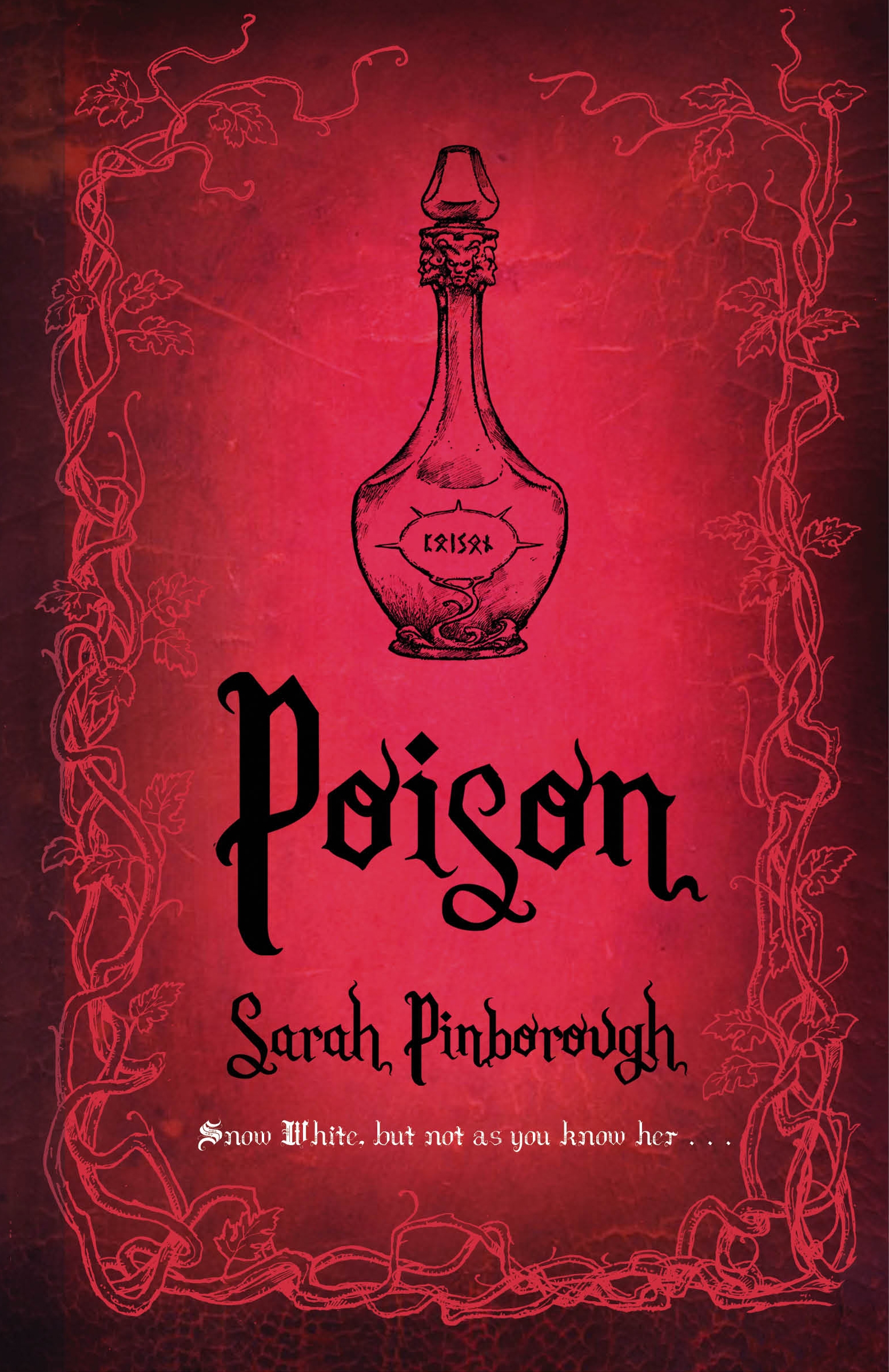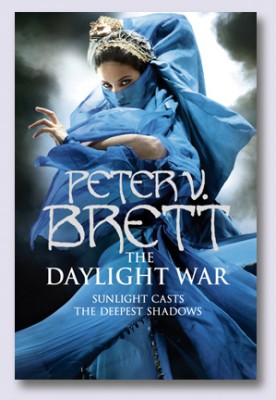Peter V. Brett - The Daylight War
Peter V. Brett's latest in his epic fantasy series is an eminently readable, but deeply flawed
novel. The third (of five) in
The Demon Cycle, expect spoilers for books one and two in the plot summary paragraph (and an assumption of familiarity), and probably scattered throughout further analysis.
The Daylight War follows the same cast of characters from the first two books, with a notable exception in the depiction of a back-story for Inevera, Jardir's wife and leader of the Dama'ting. Away from this back-story, which covers Inevera's life and training in her Dama'ting ways, as well as providing the reader with a helpful recap of events up to the point the novel is at, the plot is incredibly focused for an 800 page epic on just over a month. Following the Mind Demon attacks at the end of
The Desert Spear, both Jardir and Arlen, our two Deliver-elects, are preparing their respective City-states (or equivalent) of Cutter's Hollow and Everam's Bounty to face another waning of the moon. Only this time its personal! Or something like that, anyway.
In typical Epic Fantasy sweep, we follow the minutiae of our main characters as they overcome any and all obstacles in their way, while learning new and better powers in order to defeat the hordes of demons tat are to come at the waning. As per always with Brett's novels, the world building is fantastic - the demons come to life before our very eyes, and the geographies and civic reactions to events are believable and challenging in their own way. At one point, Jardir and his Khaffit childhood friend Ahmann discuss the method of taking the unimaginatively named Lakton, a town, unsurprisingly, in the middle of a lake. This ultra-defensive position will be nigh on impossible to take if well stocked, so, always eager to find a realistic ploy to work around with real-world events, Mr. Brett sends his characters into action to take the equally inspiringly named Docktown at 'First Snow', a time when all the harvest is conveniently gathered in one place before being levied to the Capital. Yes, there are these little conveniences, but with the crushing bureaucracy of running a fiefdom, central, easy-to-manage decision like this make sense, just as taking this harvest makes excellent sense for Jardir's formative nation. It is moments like this, the large-scale decisions and effect that Brett has done well from the outset of his wonderfully premised world.
It is, however, when we get down to the nitty gritty of character and culture that Brett, and in particular this book, falls down. The first two books had their share of the now obligatory fantasy-rape-scene, which is ugly in and of itself, and made more so by the conciliatory muddy shag that followed, to piece the post-gang-rape-very-sad Leisha back together. Because yeah, that'd happen. But, in general, I felt books 1 & 2 dealt altogether
OK with gender and sexual issues. Hell, there is even some homosexuality thrown in
and it isn't frowned upon. In fact, its considered normal (in the most part. Except when there is a bit of homosexual rape gratuitously thrown in.) But
The Daylight War really takes the biscuit when it comes to gender issues in its fantastic setting.
Jared, over on Pornokitsch, gives
this utterly compelling Hatchet Job. I'd advise you all to read it, if only to see what a truly wonderful hatchet job looks like, but also because it puts, much better than I do, the gender issues within the book into the open.
For me, the book's main issue with gender is neatly summed up by the last line of chapter 27:
"A great man does not fear his wife will steal his glory. He uses her support to reach even higher"
Yup. That's right guys. All a girl is is a leg up, or a leg over at times. They certainly aren't something to worry about if your in power - if there's a powerful woman, she'll be passed around like a tavern wench, like Leisha is, or maybe tied down by strict and nonsensical cultural cliches, like Roger's two wives. And when they have, or develop, a power of their own, be sure that blokes will have got there first, or be in control of it somehow. Like Renna, following Arlen like a puppy and never reaching his ability, nor her potential, as she sacrifices her own free will to be
more like him. Or, once again, Roger's two wives who have a magical, mystical power to their voice that can harm demons...
But only when Roger controls it. Women have vaginas - that's their only weapon that they can use, and even they are controlled by the whims of men. In a particularly cringeworthy moment at the end of Inevera's training as a Dama'ting, her virginity is taken by a large phallic stone, wielded by the head of the Dama'ting, while the rest of the Dama'ting, all naked and perfectly shave apart from their heads, watch on. Because that's not male-masturbatory fantasy in a nutshell. Following this, Inevera, who has a magical demonbone macguffin that pretty much grants one wish (in a pre-Deliverer culture is one of the most powerful things around) uses it not for protection from harm or as a potential weapon or anything realistically simple, but to
remake her hymen. Because a woman who beds a man and is not a virgin is no woman at all. Obviously.
Suffice to say, that gender treatment is dodgy at best.
Aside from that, the treatment of culture is equally dodgy at times. The Krasians are an obvious Islamic analogue, and their depiction is almost at no point a forgiving one. They are depicted as obsessed with fighting demons, with honour above all things, with multiple wives, with females as massively socially inferior (even more so than in the rest of the world). Oh, and they're non-white, so obviously the bad guys. When the cultures blend, it is dealt with well at times, occasionally subtly, and there are moments when you think that these Krasian's might even be becoming somewhat progressive. But for all that, they still think women are objects, men and male children slaves to war, and have no value for artistry or similar. And the only homosexual relations mentioned are within Krasia, which makes me feel as though this is a subtle rebuke against homosexuality, and that it shouldn't, nay
couldn't, go on in a
civilised society.
And breathe...
And finally. The ending. It's where we should end. Its crap. Jardir and Arlen spend the end of the plot rushing headlong into more and more power, pretty much rendering the last two books exposition, and nothing more as they both become nigh on superhuman: being able to fly, teleport, read minds etcetera. So MAJOR SPOILER ALERT naturally they fight each other and not the demons. Because that's internally consistent. It's all a bit rushed, as though Peter V Brett went 'Oh dear, I seem to have written 750 pages and had the waning most of the plot has been leading up to but don't have a major set piece ending - I'll bung one in for no apparent reason'. I didn't buy it, and I don't see how it isn't going to end in Jardir getting up to fight again, by developing
exactly the same powers as Arlen, which he has all along.
In conclusion, then,
The Daylight War is a decent-ish book if taken for the plot, and as a follow up if you enjoyed books 1 and 2. There's so much more I could say about it, but the major pitons are all above. It's hard going if you have a conscience about the way the Other than the white, male Anglophone is depicted. Hell, it's hard going full stop past around page 500. I'll pick up books four and five if only because I've invested so much in the story so far, but if your new to the series? Don't start it. It will only disappoint once you get this far.
Overall rating: 2*






